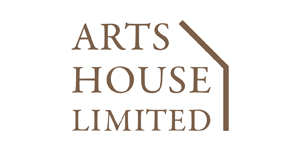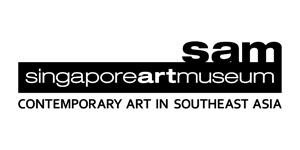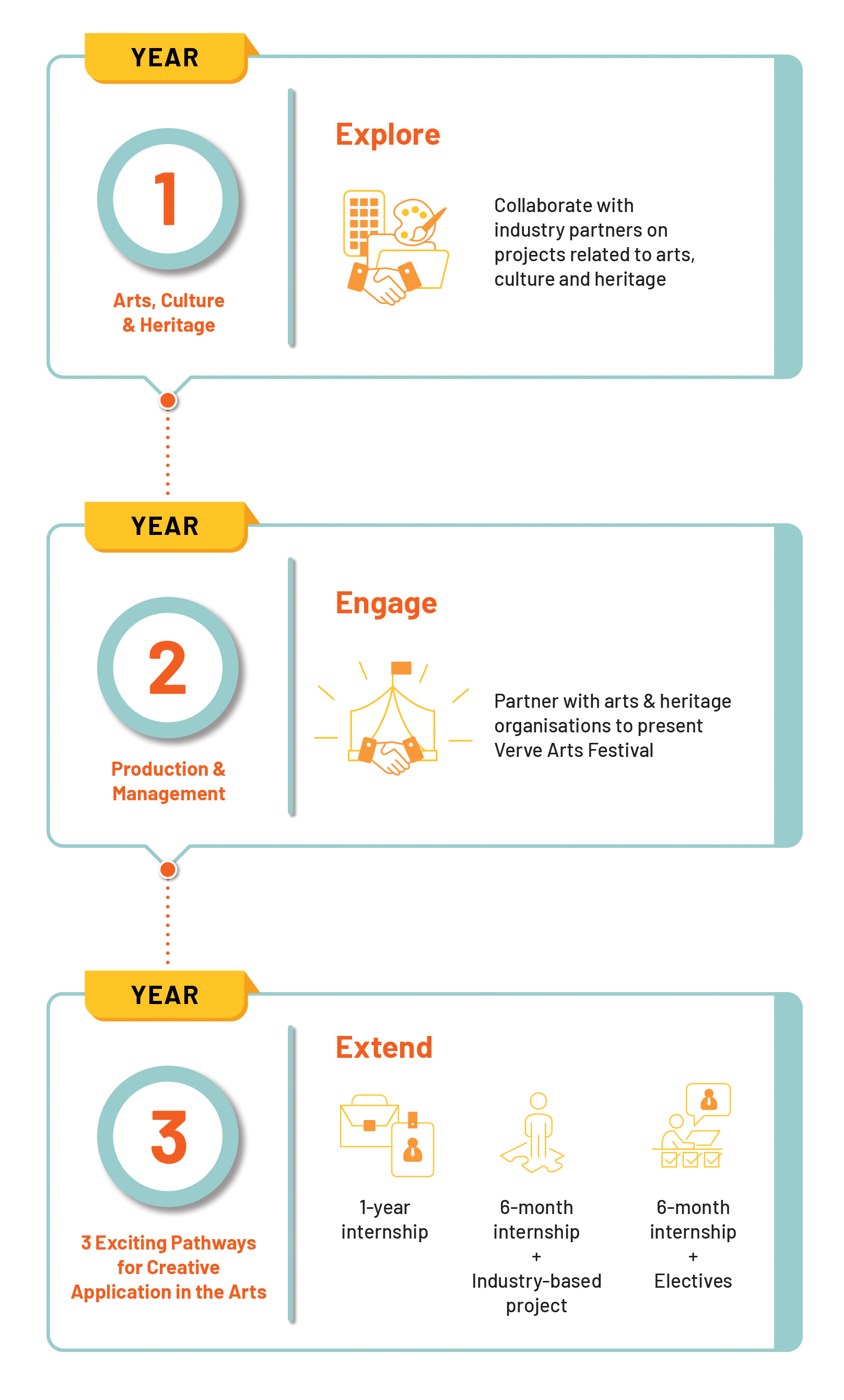Why ABM?
- Gain the skills to lead transformations in the arts, culture and heritage sectors to multiply their impact on society
- Experience real-world learning through industry projects that will help you build a stellar portfolio and professional network
- Broad-based curriculum anchored on the creative arts, heritage and event management fields to give you more career options
- In your final year, choose either a 1-year internship to deepen real-world experience or a combination of a 6-month internship and project work or elective modules to expand your skill sets!NEW
About ABM
If you love the idea of planning arts events, or working in galleries, museums, performing arts, or heritage organisations, then the Diploma in Arts Business Management (ABM) is what you are looking for!
With ABM, you will cultivate an appreciation for various creative art forms – ranging from theatre and music, to dance and visual arts – and gain the business and management skills to thrive in and contribute to the transformation of these sectors. Besides attending lectures and workshops, you can look forward to exciting industry visits and opportunities to work on projects sponsored by our reputable partners from the arts, culture and heritage fields.
To give you a solid foundation, you will be introduced to business and management skills that will teach you how to manage, market and finance arts and heritage organisations. Learn how to conduct research on cultural audiences, use digital media to market your event to specific audience segments, develop sponsorship strategies, and organise physical and digital festivals and events.
One of the highlights of your ABM journey is the opportunity to plan and organise Verve, an annual community arts festival. You will apply the skills and knowledge that you have learnt to plan and implement programmes, present arts and cultural performances, work with artists and volunteers, and ensure financial sustainability for the event.
Our tie-ups with renowned arts and heritage organisations such as the Singapore Art Museum, Arts House Limited and National Heritage Board will allow you to gain insights into the ins and outs of the local arts scene. Be prepared to learn from and get inspired by veterans of the arts, culture and heritage fields!


Overview of Your ABM Journey

Further Studies
You may enjoy up to one semester’s exemption when applying for relevant degree programmes at Nanyang Technological University and National University of Singapore.
You may also receive up to one year’s exemption at the following universities:
Australia
- Edith Cowan University
- Bachelor of Arts (Arts Management)
- Bachelor of Business
- Murdoch University
- Bachelor of Business in Hospitality & Tourism Management
- Bachelor of Business in Management
- Bachelor of Business in Marketing
- Queensland University of Technology
- Bachelor of Creative Industries
- The University of Sydney
- Bachelor of Liberal Arts and Science
- The Australian National University
- Bachelor of Arts (Art History & Curatorship)

Crystal Lee
Arts Business Management graduate, Class of 2020
Crystal is pursuing a Bachelor of Arts - Digital Media at SIM-University of Stirling.

Rohini Varsha
Arts Business Management graduate, Class of 2019
Rohini is studying History at NUS.
Careers
As an ABM graduate, you are professionally trained to manage the creative and heritage industries. And what better place to start than the flourishing arts industry in Singapore? You can look forward to pursuing careers in these job roles:
- Arts Administrator
- Artist Manager
- Events Executive
- Education and Outreach Executive
- Marketing Executive
- Programme Executive/Manager

River Chua
Arts Business Management graduate, Class of 2016
River is currently working as an Assistant Manager (Talent Development & Programming) at the NUS Centre For the Arts.

Kang Joo Soon
Arts Business Management graduate, Class of 2017
Joo Soon is currently working as a Programme Executive (Performing Arts) with Arts & Disability Singapore (ARTDIS).
Entry Requirements
AGGREGATE TYPE ELR2B2-B
To be eligible for consideration, candidates must have the following GCE ‘O’ Level examination (or equivalent) results.
| Subject | 'O' Level Grade |
|---|---|
| English Language | 1-6 |
| Mathematics (Elementary/Additional) | 1-6 |
| Any one of the 2nd group of Relevant Subjects for the ELR2B2-B Aggregate Type | 1-6 |
You must also fulfil the aggregate computation requirements for the ELR2B2-B Aggregate Type listed here ( 33KB).
For students with other qualifications, please refer to the NP website for the entry requirements and admissions exercise period.
What You Will Learn
This module aims to develop students' critical thinking, writing and presentation skills in various academic and professional contexts. Students will also learn how to conduct basic research and accurately cite sources in this module.
Essential Skills for the Digital Age (4 Credit Units)
This introductory module is designed to help students build critical digital skills needed to succeed in the 21st century. The module covers a range of topics for both the digital workplace and citizenship, including digital communication and collaboration, data investigation and analysis, productivity tools, social media, cybersecurity, responsible use of technology, as well as a roundup of the latest technology trends and future of technology.
Introduction to Arts & Heritage Management (4 Credit Units)
This module aims to introduce students to the management of the different forms of arts and heritage in the creative industries. This will be achieved through exposure to a range of topics, by field visits. The topics will focus on arts and heritage management in Singapore and the region.
Introduction to the Arts 1: Music & Visual Art (6 Credit Units)
This module aims to give an introductory understanding of the history and business of the music and visual arts sectors. The genres covered will explore the styles, characteristics, and cultural influences of different eras in both Asian and Western traditions. Topics include the production and promotion of both music and visual art.
Economics (3 Credit Units)
This module provides students with a basic understanding of economic principles and concepts, such as supply and demand, opportunity cost and law of diminishing returns, to name a few. Students will learn about market structures and its characteristics and implications on revenue. Students will also understand the application of these principles, concepts and structures, in making and predicting changes in the market, and explain patterns and behaviour in the real world.
Career & Professional Preparation 1 (1 Credit Unit)
This module gives students a foundational introduction to their three-year diploma course curriculum and how it prepares them for industry. It will help them to embark on their course with the end in mind, through guided reflection of their personal characteristics and producing an overall game plan for their future education and career goals. The module aims to deepen students’ commitment to the sector that the course prepares them for.
This module aims to provide students with an understanding of effective communication practices in the workplace. Students will develop the necessary skills to communicate effectively with stakeholders, colleagues, and clients in various communication contexts.
Introduction to the Arts 2: Theatre & Dance (6 Credit Units)
This module aims to give an introductory understanding of the history and business of the theatre and dance sectors. The genres covered will explore the styles, characteristics, and cultural influences of different eras in both Asian and Western traditions. Topics include the production and promotion of both theatre and dance.
Education, Outreach & Community Arts (4 Credit Units)
This module will explore the tools for developing education and outreach programmes to enhance public knowledge and exposure to the arts. It will also develop skills for working with the community to create and conduct arts programmes that enhance social cohesion and address issues within the community.
Visual Communication (3 Credit Units)
This module combines the examination of theories and concepts of visual literacy with the practical approach to learning about the importance of collaterals (online and print) in the creative industries. Students will learn the use of digital photography, imaging software, and the basic principles of visual design. Through the use of design software, students will experience the creative process in producing promotional and marketing materials, and learn about writing design specifications, copy-editing and production layout.
Innovation Made Possible^ (3 Credit Units)
Underpinned by the Design Thinking framework, Innovation Made Possible aims to build creative confidence in you. The module will sensitize you to the process of user-centric problem solving and allow you to discover and hone your innate ability to think creatively, come up with innovations to tackle problems and explore new ideas for your studies and beyond.
Health & Wellness^ (1 Credit Unit)
This is a Level 1 Core module for all Year 1 students. The module will introduce students to the importance of maintaining both physical and mental health through the knowledge and monitoring of health indicators, and application through appropriate exercises. The aim of the module is to empower students with basic knowledge and skills to be independent and responsible in maintaining overall personal health.
^ Interdisciplinary Studies (IS) modules account for 10 credit units of the diploma curriculum. They include modules in communication, innovation and world issues, as well as an interdisciplinary project. By bringing students from diverse diplomas together, the interdisciplinary project fosters collaboration to explore and propose solutions for real-world problems. IS aims to develop students to be agile and self-directed learners, ready for the future workplace.
Career Kickstart (2 Credit Units)
This module is designed to equip students with the skills and knowledge required to successfully navigate the transition from education to the workplace. Topics covered in this module will include job search strategies, resume and cover letter writing, interview skills, professional networking and personal branding.
Arts Marketing & Communication (4 Credit Units)
This module examines the basic concepts and principles of arts marketing to enable students to better understand and evaluate the marketing system in which products and services are planned, priced, promoted and distributed. It will also provide a comprehensive overview of the effective principles of public relations, focusing on different writing approaches and styles required for specific situations, audiences, communication objectives, content and media.
Festival & Event Management (4 Credit Units)
This module aims to develop students’ knowledge and skills in arts festival and event management. The module will focus on discussing the intricacies of fulfilling the key performance indicators of performing arts festivals and events. In particular, the students will learn how to formulate creative strategies to tackle the complex demands of conceptualising, programming, logistics planning, human resource management and risk management. They will also gain insights into the latest management practices in the local as well as the international industries.
Partnership Engagement & Volunteer Development (4 Credit Units)
This module provides students with an overview of the fundamentals of stakeholder partnerships, sponsorship and a Volunteer Management Framework in the context of the arts and heritage sectors. Students will gain an understanding of issues related to engaging stakeholders, fund-raising and sponsorship development and the role of volunteer management framework in managing issues such as volunteers' recruitment, job-match, motivation and recognition.
Research in Audience Development (4 Credit Units)
This module introduces students to the process of developing qualitative and quantitative research skills in the arts industry, particularly in arts audience development. Through lessons and tutorials, students will learn and understand the roles of art professionals, researchers and cultural policy makers, both in visual and performing arts organisations. Students will also develop a general understanding of research development and statistical interpretation.
Arts Regulation, Policy & Governance (3 Credit Units)
This module aims to examine the three main pillars of regulation, policy and governance in the Singapore arts sector. The topic of regulation would examine state intervention in the production and consumption of art. The topic of policy would examine the evolution and direction of Singapore’s arts and cultural policies. The topic of governance would examine the importance of strategic direction, leadership, organizational performance and overall accountability in the arts sector.
Creative Entrepreneurship (3 Credit Units)
This module enables students to learn about business fundamentals in the creative industry. Instilling an entrepreneurial spirit combined with creative leadership, students will learn about basic business structures, legal knowledge, intellectual property, and integrate their knowledge in marketing and financial management in the setting up and running of a business.
Financial Management (3 Credit Units)
The module introduces the basic concepts of financial management, including accounting, cash management, budgeting, cost behaviour, capital management, in relation to arts organisations. Using case studies, students will learn how to apply financial accounting principles to the arts industry.
Talent & Human Capital Management (4 Credit Units)
This module examines the crucial role of professional management for various types of artists, and students will be equipped with relevant skill sets and tools to guide the professional careers of artists. Students will also be provided with a working knowledge of human resource skills needed in the arts industry to ensure that artist management companies and arts organisations attract, develop and retain talent, to meet organisational demands and goals.
Stage & Exhibition Management (4 Credit Units)
This module provides students with technical knowledge behind stage and exhibition management. Students will learn how to read technical riders and exhibition plans, maintain production records and to use this information in the staging of performances and exhibitions.
World Issues: Singapore's Perspectives^ (2 Credit Units)
This module will expose you to a wide range of global issues discussed in the context of Singapore as a nation state. You will be guided to critically examine current affairs from various perspectives and develop an appreciation of the dynamism behind current world problems and consider possible solutions. The intent of this module is to develop thinking students with well-considered perspectives who are able to articulate reasonable opinions, make thoughtful decisions and informed choices as active citizens in society. You will also be exposed to a multidisciplinary approach in the mitigation of global challenges and thus be adequately prepared to handle Year 3 IS interdisciplinary Project ID.
This module provides the opportunity for students to be assigned to industry attachments at reputable organisations. The attachment, which will be for the entire internship semester, will match students’ abilities and interests to relevant organisations.
Project ID aims to prepare you for an increasingly globalized and interconnected world where problems are multi-faceted and require interdisciplinary research and collaboration to solve. Using a project-based learning approach, you will have the opportunity to work in a multi-disciplinary team with students from across the polytechnic to investigate and propose comprehensive recommendations for a pressing real-world problem affecting Singapore. You will be guided to step out of your disciplinary silos and effectively communicate and collaborate with peers from different backgrounds. The module seeks to develop independent learning skills and the ability to synthesize diverse strands of knowledge to solve a complex problem, while impressing on you the importance of being a responsible global citizen.
Description of Elective Modules
Extended Internship (16 Credit Units)
The extended internship allows the student to extend their internship and undergo additional sector relevant on-the-job training in a real-life working environment. In the process, the student will experience working as part of a team and may be exposed to more varied aspects of their chosen area of interest in the sector.
Industry-based Project (16 Credit Units)
For the industry-based project module, students are required to complete a substantial project that is the culmination of their education in the School of Humanities & Social Sciences. Students may have the opportunity to work in cross-disciplinary teams to address a real-world problem proposed by a client or proposed by a student in subjects approved by the School.
Social Sustainability (4 Credit Units)
This module introduces students to the social, cultural, and economic dimensions of sustainable development. Students will explore the concepts of sustainability and social responsibility in the context of global and local challenges such as poverty, inequality, climate change and the environment. They will learn about the different models of community development, stakeholder engagement, and participatory decision-making that promote social sustainability. The course would also examine the role of businesses and organizations in promoting social sustainability through corporate social responsibility (CSR) initiatives and sustainable business practices. Through case studies, group projects, and interactive discussions, students would develop a critical understanding of social sustainability issues and learn practical skills to address them in their personal and professional lives.
Frameworks for Solutioning (4 Credit Units)
This module will provide students with a comprehensive understanding of the social impact landscape and equip them with practical tools to design and implement effective solutions. The course would introduce students to different frameworks for social impact and to apply these frameworks to social and environmental problems to develop innovative and sustainable solutions that meet the needs of diverse stakeholders. The course would cover topics such as problem definition, research methods, ideation, prototyping, testing, and scaling. Students would also learn about the importance of social impact measurement and evaluation, and how to use data and metrics to assess the effectiveness of their solutions. Through case studies, group projects, and real-world examples, students would develop a deep understanding of the challenges and opportunities of social impact work and acquire the skills and mindset necessary to make a meaningful difference in their communities and beyond.
Understanding Social Challenges (4 Credit Units)
This module provides an interdisciplinary approach to understanding social challenges, such as poverty, inequality and discrimination. Through readings, lectures, discussions, and case studies, students will explore the complex and interrelated causes and consequences of these challenges, as well as potential solutions and interventions.
Understanding Place-Based Challenges (4 Credit Units)
This module provides an interdisciplinary approach to understanding the challenges faced by communities in specific places, such as housing, transportation, safety and land use. Through readings, lectures, discussions, and case studies, students will explore the complex and interrelated causes and consequences of these challenges, as well as potential solutions and interventions.
Communicating to Create Social Change (4 Credit Units)
This module provides an introduction to the art of storytelling and its potential for creating social change. Students will learn how to craft compelling narratives that communicate complex social issues and inspire action. Through readings, lectures, discussions, and hands-on activities, students will explore various forms of storytelling, including visual, written, and oral. The course will also cover topics such as audience analysis, message framing, and impact evaluation.
Digital Strategies for Social Change (4 Credit Units)
This module explores the ways in which technology can be used to advocate for social change. Through readings, lectures, discussions, and hands-on activities, students will learn how to use digital tools and platforms to raise awareness, mobilize support, and influence public policy. The course will cover topics such as social media for outreach, gamification for promoting causes and digital storytelling.
